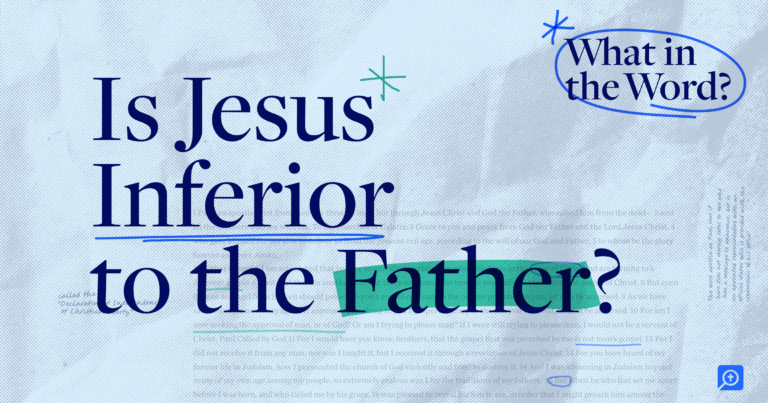
Is Jesus really less than the Father? In this What in the Word? episode, Kirk E. Miller is joined by theologian Michael Horton to tackle John 14:28, where Jesus says, “The Father is greater than I.”
Does this verse undermine belief in Jesus’s divinity and equality with the Father? What did Jesus mean in context—and what have Christians historically believed about this passage?
Together, Kirk and Mike explore multiple historical interpretations, including Arianism, eternal generation, the state of Christ’s humiliation, eternal functional subordination, and more. They conclude with practical insights for teaching and applying this deeply theological text.
Follow the show on YouTube, Spotify, Apple Podcasts, and more.
What you’ll find
Special offers

A Free Book Just for You
Logos has given away over 5 million free books, empowering Christians globally to study deeply. Get a shiny, new free book every month!
Claim your free book

Exclusive Lexham Press Tough Texts Bundle
Have more questions about the Bible? Get the 10-volume Lexham Press Tough Texts Bundle designed exclusively for fans of What in the Word?
Get the bundle

The Future of Bible Study is Here
Unlock in-depth study of God’s Word, plus exclusive discounts, free books, and more starting as low as $9.99/month—only with the new Logos.
Start a free trial
Connect with us
Ready to increase biblical literacy? Like and share. To go the extra mile, leave us a review on your preferred platform.
Subscribe to get future episodes. (Bonus: We’ll send you a discount to use on your first purchase.)
Thanks for subscribing to Word by Word!
Use code WORDBYWORD to save 10% on your first order.
Episode guest: Michael Horton
Michael S. Horton (PhD, Wycliffe Hall, Oxford and Coventry University) is the J. Gresham Machen Professor of Systematic Theology and Apologetics at Westminster Seminary California, founder and editor-in-chief of Sola Media, and host on White Horse Inn, a weekly roundtable podcast on theology and culture.
Dr. Horton has written over thirty books, including award-winning titles such as Justification (2 vols.), The Christian Faith, and Christless Christianity. His most recent book is Shaman and Sage: The Roots of “Spiritual but Not Religious” in Antiquity, the first of three volumes in his intellectual history of “spiritual but not religious” as a phenomenon in Western culture.
Episode synopsis
The disputed phrase: “The Father is greater than I”
This episode addresses a deeply theological and frequently debated statement made by Jesus in John 14:28: “The Father is greater than I.” How should Christians interpret Jesus’ swords within the broader framework of Scripture and Trinitarian theology, avoiding common misunderstandings perpetuated by heresies both ancient and modern?
Setting the context: John’s upper room discourse
Before interpreting John 14:28, Mike emphasizes the importance of situating it within its narrative context—namely, Jesus’s upper room discourse found in John 14–16. This passage is part of a larger sermon Jesus gives to his disciples before his crucifixion and resurrection.
Jesus repeatedly announces his departure and promises the coming of the Holy Spirit. The disciples are confused and discouraged by his words, expecting a triumphant earthly kingdom rather than a crucified Messiah. Jesus reassures them, explaining that his departure is necessary for the Spirit to come and for their ongoing mission to begin.
Heretical & non-Christian interpretations
This statement—“The Father is greater than I”—has often been used to argue that Jesus is somehow lesser than God, or not God at all. Mike identifies two primary groups that misinterpret this verse:
- Arians (historically and in modern forms such as Jehovah’s Witnesses), who argue that Jesus is a created being and not fully divine.
- Subordinationists, who claim a hierarchical relationship in which the Father is eternally superior to the Son and Spirit in rank and authority.
Additionally, this verse is frequently cited in interfaith apologetics by Muslims and other non-Trinitarian monotheists to challenge the Christian doctrine of the deity of Christ.
The orthodox interpretation: incarnation, humiliation, mission
Mike then presents what he and the broader Christian tradition affirm as the orthodox interpretation. According to the church fathers at the Council of Nicaea and subsequent Christian thinkers, Jesus’s statement should be understood in light of his incarnation and mission—not his eternal divine nature.
In this view, the “greater than” statement refers to:
- Jesus’s incarnation as the obedient Son, living under the law (Gal 4:4).
- His state of humiliation, having “made himself nothing” and taking on human form (Phil 2).
- His economic mission, the Son being sent by the Father, fulfilling his redemptive purpose.
This interpretation affirms that, while the Son is equal to the Father in essence (ontologically), he voluntarily assumes a subordinate role in his earthly mission and is inferior to the Father with respect to his humanity. As the Athanasian Creed states,
It is necessary to everlasting salvation that he also believe rightly the incarnation of our Lord Jesus Christ. For the right faith is that we believe and confess that our Lord Jesus Christ, the Son of God, is God and man. God of the substance of the Father, begotten before the worlds; and man of substance of His mother, born in the world. Perfect God and perfect man, of a reasonable soul and human flesh subsisting. Equal to the Father as touching His Godhead, and inferior to the Father as touching His manhood.1
Immanent vs. economic Trinity
A major theme of the episode is the classical theological distinction between the ontological Trinity and the economic Trinity:
- Immanent (or ontological) Trinity refers to the the Trinity as it exists in itself, eternally, apart from creation. Namely, each person of the Trinity is co-equal and co-eternal, truly and equally God.
- Economic Trinity refers to the Trinity in its relation to creation. This includes the roles each person of the Godhead assumes in God’s redemptive plan. The Father sends, the Son accomplishes redemption, and the Spirit applies it.
Mike stresses that Jesus’s statement in John 14:28 should be understood within this economic framework. The inferiority mentioned here refers to the Son’s role in redemptive history: It is not a claim of inferiority in divine essence or eternal relationship to the Father. As Augustine warned,
Men have erred through a want of careful examination or consideration of the whole tenor of the Scriptures, and have endeavored to transfer those things which are said of Jesus Christ according to the flesh, to that substance of His which was eternal before the incarnation, and is eternal.2
Eternal functional subordination (EFS): a modern evangelical debate
Mike critiques a more recent theological development within evangelical circles known as eternal functional subordination (EFS). Proponents of EFS affirm the equality of the Trinity in essence but argue for an eternally existing hierarchy of roles, with the Father always having had functional authority over the Son and Spirit.
According to Mike, this position:
- Echoes subordinationist logic, even if unintentionally
- Projects economic roles back into the immanent Trinity
Mike warns that importing human social or familial analogies (e.g., husband and wife) into Trinitarian theology leads to theological error and can distort both doctrine and discipleship.
Eternal generation & the Son’s distinction
In response to the EFS view, Kirk and Mike turn to the historic doctrine of eternal generation, which maintains that:
- The Son is eternally begotten of the Father (e.g., John 1:18)
- This begetting is not a matter of time but an eternal relationship
By grounding distinctions among the divine persons in supposedly social relations (i.e., authority and submission) rather than each person’s unique personal properties, as found in their eternal relations of origin, EFS undermines the doctrine of eternal generation. Importantly, eternal generation does not imply inferiority. Instead, it secures both the distinction and the equality of the persons. Namely, the Son is everything the Father is, except he is the Son, not the Father.
Human limitations & Christ’s two natures (the hypostatic union)
The conversation shifts to how Scripture portrays Jesus’s human limitations. Mike affirms the hypostatic union—Jesus is truly God and truly man, two natures united in one person.
Scripture reflects this union:
- As God, Jesus is omniscient, eternal, and sovereign
- As man, He grows, learns, experiences hunger, thirst, fatigue, and even ignorance (e.g., “no one knows the day or hour,” Mark 13:32)
These limitations do not undermine Jesus’s divinity. Rather, they confirm his full humanity, which was necessary for him to redeem fallen humanity. So too here (John 14:28), Jesus can be said to be inferior to the Father.
Practical theology: why it matters
Mike closes by drawing out the pastoral and devotional implications of this doctrine.
- How we pray: Christians should relate distinctly to each person of the Trinity. We pray to the Father, through the Son, by the Spirit—but we can also address the Son and Spirit directly.
- Trinitarian fellowship: A biblical understanding of the Trinity enriches our communion with God. We do not relate to a vague divine essence but to the Father who sends, the Son who saves, and the Spirit who sanctifies.
- Worship and precision: Mike urges Christians to grow in theological precision—not to be pedantic, but to rightly know and worship the God who has revealed himself as Trinity.
Reading Scripture with theological categories
Throughout the episode, Mike returns to a key exhortation: interpret Scripture with theological discernment. Heresies arise not from denying the Bible, but from mishandling it—isolating verses from their broader context and theological meaning.
Kirk agrees, adding that pastors and teachers should give people the tools to read the Bible well. This includes teaching theological categories such as:
- Ontological vs. economic Trinity
- Eternal generation and procession
- Two natures of Christ
- Mission vs. procession
These distinctions are not abstract—they help believers understand difficult passages and avoid serious doctrinal errors. As Mike and Kirk affirm, theological clarity leads to deeper worship, more faithful discipleship, and richer communion with the triune God.
Conclusion: So what’s the point?
Jesus’s words in John 14:28 are not a denial of his divinity but a reflection of his humble, obedient mission. His departure, far from being a loss, inaugurates a new and greater stage in God’s redemptive plan—the pouring out of the Spirit and the global expansion of the church.
Logos values thoughtful and engaging discussions on important biblical topics. However, the views and interpretations presented in this episode are those of the individuals speaking and do not necessarily reflect the official position of Logos. We recognize that Christians may hold different perspectives on this passage, and we welcome diverse engagement and respectful dialogue.
Related resources for further study
Historic Creeds and Confessions
Save $0.25 (5%)
Price: $4.74
-->Regular price: $4.99
The Trinity (De Trinitate)
Save $2.80 (5%)
Price: $53.19
-->Regular price: $55.99
Father, Son and Spirit: The Trinity and John’s Gospel (New Studies in Biblical Theology, vol. 24 | NSBT)
Save $1.00 (5%)
Price: $18.99
-->Regular price: $19.99
The Expository Thoughts of J.C. Ryle (7 vols.)
Save $2.90 (5%)
Price: $55.09
-->Regular price: $57.99
The Biblical Trinity: Encountering the Father, Son, and Holy Spirit in Scripture
Save $1.00 (5%)
Price: $18.99
-->Regular price: $19.99
The Trinity and the Bible: On Theological Interpretation
Save $0.90 (5%)
Price: $17.09
-->Regular price: $17.99
The Trinity: An Introduction (Short Studies in Systematic Theology)
Save $0.60 (5%)
Price: $11.39
-->Regular price: $11.99
Simply Trinity: The Unmanipulated Father, Son, and Spirit
Save $1.25 (5%)
Price: $23.74
-->Regular price: $24.99
Mobile Ed: CH261 History of the Doctrine of the Trinity (10 hour course)
Save $19.00 (5%)
Price: $360.99
-->Regular price: $379.99
Mobile Ed: TH361 Perspectives on the Trinity: Eternal Generation and Subordination in Tension (4 hour course)
Save $7.50 (5%)
Price: $142.49
-->Regular price: $149.99

 15 hours ago
6
15 hours ago
6










 English (US) ·
English (US) ·